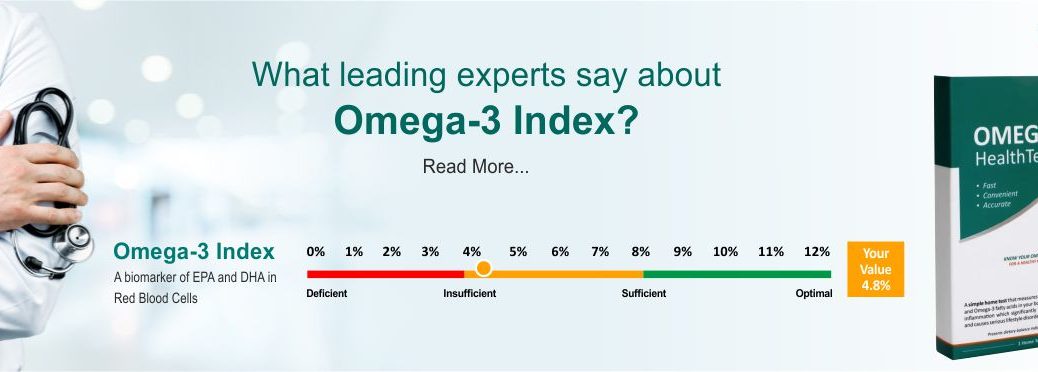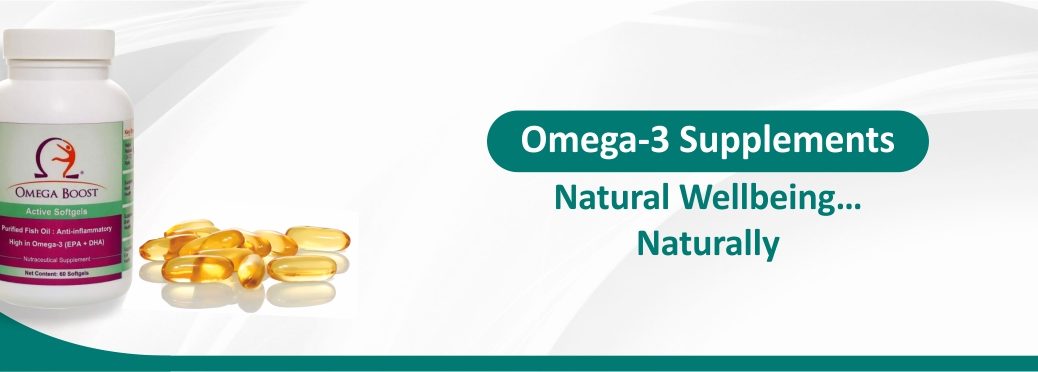According to Dr Axel F. Sigurdsson under Doc’s Opinion blog about Heart Disease, Nutrition, Healthy Lifestyle and Prevention of Disease, it is well known that nutrients such as “Omega-3” carry the label “essential” because they’re vital for our health. Their regular consumption has numerous health benefits. Today, every person is aware about health benefits of Omega -3 consumption but still many people are not consuming Omega-3 on daily basis. Or those people who are taking Omega-3 are not consuming enough quantity. Many questions appear in mind when people start supplementing themselves with Omega-3. Does everybody need to consume Omega-3? Is eating fish sufficient or do we need to take supplements? Is there a way to tell that our body are getting enough omega-3 or if we are deficient?
The answer to all these questions is the Omega-3 Index.
What is Omega-3?
The Omega-3 Index is the relative amount of omega-3 fatty acids (Eicosapentaenoic acid, EPA and Docosahexaenoic acid, DHA) within red blood cell membranes. This index can be measured by specific analytical methods using a simple blood sample. Rather it is be better to say 1 drop of blood sample. All you require is to take the OMEGA HealthTest.
Numerous studies show that a low Omega-3 Index is associated with increased risk of cardiovascular disease, and it has been proposed that raising the index may help to reduce risk.
The fats we consume in our diet are mainly triglycerides. Triglycerides are composed of three molecules of fatty acids attached to a glycerol molecule. The type of fatty acids in triglycerides determines the characteristics of fatty foods, such as whether it is solid or liquid at room temperature. Measurements of fatty acids in red blood cell membranes can provide important information about fatty acid intake. Recently, the relative amount of omega-3 fatty acids in red blood cells has attracted interest as it may provide information about the future risk of heart disease.
Taking the OMEGA HealthTest from Lipomic Healthcare will provide you a detailed and a complete fatty acid profile of your blood sample. Lipomic Healthcare will categorize your fatty acid profile into 4 important categories of fatty acids found in red blood cells which are: saturated fatty acids, monounsaturated fatty acids, omega-3 polyunsaturated fatty acids (n-3), and omega-6 polyunsaturated fatty acids (n-6). Unfortunately the very essential omega-3 and omega-6 fatty acids cannot be produced by the human body. These fatty acids must come from food and are therefore called essential fatty acids.
Two important Omega-6 fatty acids are linoleic acid and arachidonic acid. All of the omega-6 fatty acids can be synthesized from linoleic acid, but linoleic acid itself can not be synthesized by the body and therefore it has to be provided in our diet. Linoleic acid is typically found in vegetable oils (corn, safflower, soybean) and small amounts are found in canola, olive and flaxseed oils.
Three very essential Omega-3 fatty acids are alpha-linolenic acid (ALA), eicosapentaenoic acid (EPA) and docosahexaenoic acid (DHA). ALA is found in many vegetable oils (rapeseed, flaxseed, and soybean), canola and olive oils, seeds, and nuts. EPA and DHA are typically found in fatty fish and fish oils.
Taking the Omega HealthTest from Lipomic will let you access your fatty acid status of RBCs by giving just 1 drop of blood sample using the lancet provided within the test kit. The results will not only reflect your Omega-3 Index, but laboratory will provide you your exact dietary & inflammatory status of your body. The Omega-3 Index reflects the relative amount of EPA + DHA in red blood cells. It is expressed as the percentage of the total amount of fatty acids present. In fact it’s quite simple; if 8% of all the fatty acids present in red cell membranes is EPA+DHA, the Omega-3 Index is 8%. From a methodological point of view, determining the Omega-3 Index has distinct advantages over determining levels of EPA+DHA in blood or plasma.
The Omega-3 Index and Cardiovascular Risk
Assessing Omega-3 Index may let you predict the risk of future cardiovascular events such as coronary heart disease and cardiac arrest. It means Omega-3 Index values below 4 % which indicates deficiency may be regarded as a risk factor, similar to smoking, high blood pressure and high blood levels of LDL cholesterol.
The average Omega-3 Index in the United States is believed to be between 4-5 %. In Japan, where coronary artery disease is less common and life span longer, the average Omega-3 Index is 9-10%. In general, the Omega-3 Index is higher in countries that consume more omega-3 fatty acids.
The Seattle PCA study published in 1995 showed that compared with an Omega-3 Index of 3.3% (the mean of the lowest quartile), an index of 5.0% (the mean of the third quartile) was associated with a 70% reduction in the risk of primary cardiac arrest.
In a 2004 publication, Harris and Von Schacky presented data from epidemiological studies and randomized controlled trials showing that the Omega-3 Index was inversely associated with the risk for mortality from coronary heart disease3. An Omega-3 Index of ≥8% was associated with the greatest protection, whereas an index of ≤4% was associated with the least.
Another study, published 2008 showed that the Omega-3 Index as independently associated with the risk of developing acute coronary syndrome. The risk of acute coronary syndrome was 70% lower in individuals with Omega-3 Index ≥8% compared with those with an index & ≤4%. Results from The Heart and Soul Study published in Circulation 2010 showed that in patients with stable coronary heart disease, an Omega-3 Index below median was associated with significantly higher mortality than among patients with an index above median.
One study found that a higher omega-3 index is associated with increased insulin sensitivity and a more favourable metabolic profile in middle-aged overweight men. All the above data suggest that the Omega-3 Index is inversely associated with the risk of cardiovascular disease. However, these studies don’t prove that there is a causative relationship between the Omega-3 Index and cardiovascular disease or that improving the index will reduce risk.
What Is the Optimal Omega-3 Index and How Can It Be Improved?

The Omega-3 Index is shown in an easy to interpret colour scheme. If your results fall in the red (≤4%) and yellow area (4% to 8%), you are advised to consider changing your diet. Green area (≥8%) which is considered to be sufficient & optimal means your diet is balanced and protects you against many lifestyle related health issues.
The simplest way to improve the Omega-3 Index is to increase the intake of EPA and DHA by eating marine products rich in omega-3 fatty acids. Studies show that the Omega-3 Index is influenced by intake of EPA and DHA: every 4 g of EPA and DHA ingested per month increased the Omega-3 Index by 0.24 %. The Omega-3 Index is also influenced by age, diabetes, body mass index, gender, physical activity, and some other factors, like social status and alcohol intake.
Increased intake of fish oil (EPA and DHA) may have several health benefits. A few of them are:
• Reduce both systolic and diastolic blood pressure, especially among elderly people with hypertension.
• Lowers heart rate.
• Improves the function of the endothelium, the innermost layer of our arteries.
• Reduce chronic low-grade inflammation.
• Lowers blood levels of triglycerides by 25-30 percent (16). Relatively high doses are needed to achieve this effect (up to 3-4 g/day).
What Types of Fish Contains Most Omega-3 Fatty Acids?
High Omega-3 content fishes: Salmon, herring pickled, tuna Bluefin, mackerel, sardines (canned in oil) and oysters (steamed).
Intermediate Omega-3 content fishes: swordfish, rainbow trout, sea bass, crab king, walleye, tuna (canned in water) and flatfish
Low Omega-3 content fishes: Halibut, Northern lobster, clams, scallop, haddock, cod, mahi-mahi, shrimp, and catfish
Fish or Fish oil Supplements
Not everyone loves to eat fish. And, high omega-3 content fishes are also not available everywhere. Some people are allergic to fish, or some are vegetarian or pregnant. Therefore, fish oil supplements can be a good alternative to consume Omega-3 fats. When choosing a fish oil supplement, make sure it contains EPA and DHA, two very essential Omega-3 fats that are proven to reduce blood pressure, cholesterol and inflammation. If you’re a vegetarian who doesn’t want to consume anything that is associated with fish, then you can purchase an algae-based DHA supplement as an option.
According to the AHA, if you want the full omega-3 fatty acid health benefits, then fish reigns supreme. Studies have shown that fish, in addition to providing cardiovascular benefits, is loaded with healthy vitamins and minerals as well as protein that you just can’t get from fish oil supplements. But taking a fish oil supplement, especially if you don’t like fish or can’t get enough in your diet, is a great backup plan.
References
• https://www.virtua.org/articles/fish-vs-fish-oil-which-is-better
• https://www.docsopinion.com/2015/10/05/the-omega-3-index/



